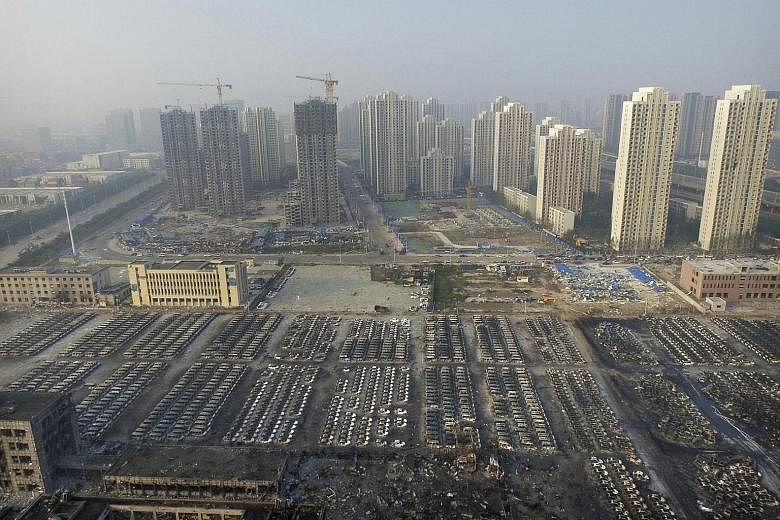TIANJIN, China (REUTERS, AFP) - China warned residents near the site of two huge explosions in Tianjin who had taken refuge in a school to evacuate on Saturday after a change in wind direction stoked fears that toxic particles could be blown inland.
The evacuation came as a fire broke out again at the site of Wednesday's deadly blast in the north-eastern port city, a warehouse specially designed to store dangerous chemicals, the official Xinhua news agency said.
Evacuees were advised to wear long trousers and face masks, according to a post on the official micro-blog of the Tianjin branch of the National Health and Family Planning Commission of China. But there was no sense of panic on the streets, witnesses said.
Chinese police also confirmed for the first time the presence of deadly sodium cyanide at the site of the blast that killed a reported 104 people, state media said, as a series of new, small explosions were heard and small fires broke out.
Police confirmed the presence of the chemical, fatal when ingested or inhaled, "roughly east of the blast site", the state-run Beijing News said.
It did not say how much had been found or how great a risk it posed but residents expressed concern about the air and water.
"I do feel a bit afraid," said construction worker Li Shulan, 49, when asked about the air quality. "It definitely doesn't feel good. As you can see our boss is making us wear masks."
An area three km from the site was cordoned off, the Beijing News reported.
There were about seven small explosions in the area on Saturday, according to a post on the micro-blog of the official China Central Television.
A Reuters witness said a fresh blaze ignited cars in a parking lot next to the blast site. The cause was not immediately clear. State media carried reports of other fires in the area.
A retired environmental official earlier told reporters that air pollution posed no risk. Harmful substances could not be detected in the air from 17 monitors placed around the city, he said.
About 6,300 people were displaced by the blasts with around 721 injured and 33 in serious condition, Xinhua said. Shockwaves from the explosions were felt by residents in apartment blocks kilometres away in the city of 15 million people.
Twenty-one of the dead were fire fighters. About a dozen family members of missing fire fighters tried to storm a press conference on Saturday, angry at a lack of information about their loved ones.
"We have gone to each and every hospital by ourselves and not found them," said Wang Baoxia, whose elder brother is missing. "There is no government official willing to meet us. Not even one," she said.
Relatives said around 25 fire fighters they said were missing were young contract workers not part of official city fire brigades.
Media reported that such fire fighters in China, often only on two-year contracts, lack training as new recruits.
After Wednesday's blasts, fire crews were criticised for using water to douse flames which may have contributed to the blasts given the volatile nature of the chemicals involved.
Industrial accidents are not uncommon in China following three decades of fast growth. A blast at an auto parts factory killed 75 people a year ago.
- 'SPREADING RUMOURS' -
More than 360 social media accounts were shut down or suspended for "spreading rumours" about the blasts, Xinhua reported citing the Cyberspace Administration of China.
Examples included "toxic gas blown to Beijing", "no one survived within one kilometre of the blast site" and "malls and markets looted", it said.
Popular verified bloggers had also made "irresponsible" comments about the blasts, such as comparing them to the atomic bombs dropped on Japan during World War II, it added.
Chinese authorities and Internet companies operate a vast censorship system and while there has been extensive discussion of the explosions, it has been confined within set boundaries.
"Every time when disaster happens, state media always spread heroic acts," one poster on social media wrote. "In the end, people are touched by these stories. Then nobody asks the cause of the accident to explore the truth."
The People's Daily said earlier that the facility's construction "clearly violated" safety rules.
Under Chinese regulations, warehouses stocking dangerous materials must be at least one kilometre away from surrounding public buildings and main roads, it said, but there were two residential compounds and several main roads within that distance.

